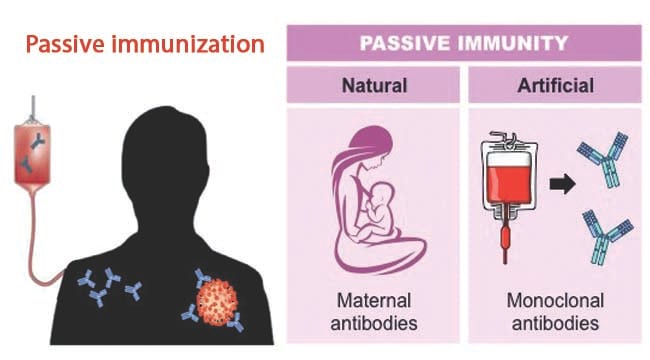- Immunization is the process whereby a person naturally acquires or is induced to acquire immunity or resistance to an infectious disease.
- An individual can acquire such immunity either passively or actively and thus immunization may be active or passive immunization.

Interesting Science Videos
Passive immunization
- In passive immunization, a person receives antibodies or lymphocytes that have been produced by another individual’s immune system while in active immunization the individual’s own immune system is stimulated to produce antibodies and lymphocytes.
- Passive immunization is hence the administration of preformed antibodies, usually IgG.
- It may arise naturally, such as when a fetus receives antibodies from the mother across the placenta or when a breast-feeding infant ingests antibodies in the mother’s milk.
- However, passive immunization also can be conferred artificially by means of preformed antibodies administered through intravenous or intramuscular routes.
- These antibodies may be derived from individuals who have high titres to particular microbes and are used to provide rapid protection.
- Antibodies given to immune deficient patients are usually IgG-derived from pooled normal plasma or purified blood products of immune people.
- Antibodies preformed in animals has also been used against some diseases, the most common being that of the horses. However, the danger of immune complex formation and conditions like serum sickness with repeated administration must be checked for.
- Passive immunization is done either as prophylaxis or as a post exposure measure.
- Passive immunization is also used to provide protection in immune compromised individuals who are unable to make the appropriate antibody response.
- It may also be handy under some conditions in which a person is incapable of making any antibody at all, i.e., severe combined immunodeficiency.
- Pre-formed antibodies have to be given on a continuous basis, ideally every three weeks, since they are continuously catabolized and only effective for a short period.
- Infections in which passive immunization is important include diptheria, tetanus, rabies etc., in events of accidental exposure to certain pathogens such as hepatitis B or at other instances such as snake bites.
Advantages of Passive immunization
- Passive immunization with preformed antibodies leads to prompt availability of large amounts of antibody. It is thus quick acting, producing an immune response within hours or days, faster than a vaccine.
- It helps to prevent or slow down the course of disease.
- It is beneficial to high-risk individuals, such as people with immune system deficiencies.
Drawbacks of Passive immunization
- The protection offered by passive immunization is short-lived, usually lasting only a few weeks or months since it do not lead to the formation of long-lasting memory immune cells.
- In passive immunity it is possible to initiate hypersensitivity reactions if the antibody is from another species.
- Antibody treatment cannot be used for routine cases of diseases.
- Antibodies can be difficult and costly to produce.
- Many antibody treatments must be given via intravenous injection, which is a more time-consuming and potentially complicated procedure than the injection of a vaccine.
References
- Lydyard, P.M., Whelan,A.,& Fanger,M.W. (2005).Immunology (2 ed.).London: BIOS Scientific Publishers.
- Owen, J. A., Punt, J., & Stranford, S. A. (2013). Kuby Immunology (7 ed.). New York: W.H. Freeman and Company.
- Playfair, J., & Chain, B. (2001). Immunology at a Glance. London: Blackwell Publishing.
- The College of Physicians of Philadelphia (2018, January 10). Passive Immunization. Retrieved from https://www.historyofvaccines.org/content/articles/passive-immunization
- Encyclopaedia Britannica (2017, November 22). Immunization. Retrieved from https://www.britannica.com/science/immunization
